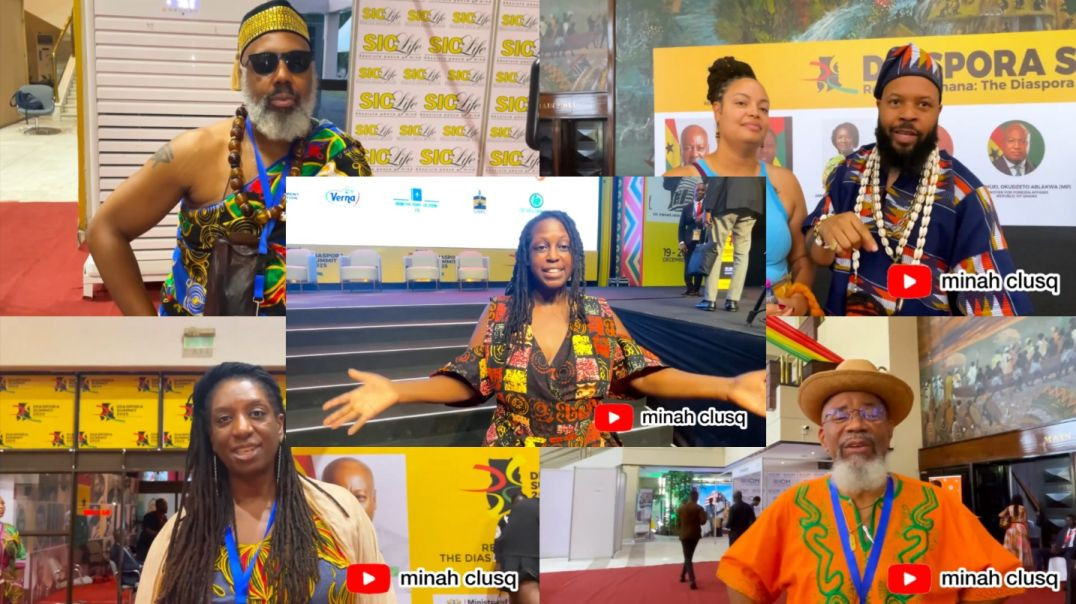Top videos
Provided to YouTube by ONErpm
Burkina Faso · Turner · Trevon Turner · dj spider
Inna Groove Riddim
℗ DJ SPIDER GW MUSIC
Released on: 2025-10-07
Producer: dj spider
Auto-generated by YouTube.
"So Amazed" by Malenga: Visions of Kmt
https://www.abibitumi.com/prod....uct/visions-of-kmt-m
Register for the Abibitumi Conference and Abibifahodie Festival at https://www.abibitumi.com
Ghana’s 🇬🇭 Biggest Diaspora Summit 2025, Connecting And Exploring Investment Opportunities
This lecture focuses on the topic of education and is part one of a series of presentations given in 1989. It (the series) attempts to "operationally define" an African-centered (relevant) education. The lecture is only general, of course, and much of what it covers will be dealt with in greater detail in the soon-to-be-published book, Educating the Black Child for the Twenty-First Century: A Rationale for an African-centered Pedagogy. Look for this some time this year or 2017-2018. Contact and other information are provided below:
Facebook: https://www.facebook.com/DrAmosWilson
Phone: (718) 462-1830
Website: www.AfrikanWorldInfoSystems.com
2nd part of lecture with Dr Amos Wilson - How White Society promotes Violence in the Afrikan Community
the master teacher!
http://www.eyeopenerproduction....s.net/psychologysoci
Dr. Ọbádélé Kambon on Tv3's New Day Program
September 3, 2013
Interviewed by Nana Aba Anamoah and Ama K. Abɛbrɛsɛ
Twi and English
2016 UG Provost Publications Award: Dr. Obadele Kambon
Kambon, O. (2015). Theory of Endogenous and Exogenous Motivation in L2 Migration. Per Linguam, 31(2). http://dx.doi.org/10.5785/31-2-594
Available as a free download here:
http://perlinguam.journals.ac.....za/pub/article/view/ /
http://ugspace.ug.edu.gh/handle/123456789/7433
https://www.researchgate.net/p....ublication/281107402
https://www.academia.edu/16125....266/THEORY_OF_ENDOGE
ABSTRACT: Implied in theories of Second Language Acquisition (SLA) is the notion that language learning is analogous to obtaining or acquiring a possession – thus the use of the term ‘acquisition.’ While this interpretation has gone relatively unchallenged in the literature, this article introduces a new analogy whereby language learning is seen as analogous to a process of permanent or semi-permanent migration towards a new socio-linguistic L2 space. As such, a theory of endogenous and exogenous motivation is delineated, entailing a dynamic interplay between internal (primarily psychological) and external (primarily sociological) push-pull factors. Endogenous and exogenous push-pull factors, together with various other personal factors, contribute to learner decisions to migrate towards, move away from or remain inert with regard to the target language. Further, motivation is framed in the larger theoretical context of causation.
===============================
UNIVERSITY OF GHANA
COLLEGE OF HUMANITIES
2018 Provost Publications Award
(Early Career)
This Award is presented to Dr. Obadele Kambon (Research Fellow, Institute of African Studies, University of Ghana) as the winner of the 2016 Provost Publications Award (Early Career). The award is based on your Paper titled: "Theory of Endogenous and Exogenous Motivation in L2 Migration" which was published in Per linguam, 31(2)2015" Your article has been noted to be a great input in the area of language teaching and learning and this work will be used by many researchers and foreign language teachers.
Also, your work is deemed as provocative, perceptive and a well researched paper that has unmistakable relevance for the teaching and learning of foreign languages and target languages."
Your write-up is an original contribution which challenges current theories that account for second language acquisition.
Dr. Obadele Kambon , for your outstanding contribution to knowledge and scholarship and for breaking new grounds, the College of Humanities is proud to award you the 2016 Provost Publications Award (Early Career)
Congratulations.
Professor Samuel Agyei-Mensah
Provost








![Abibifahodie Asako: History of Capoeira as an Instrument of Afrikan Liberation [Twi and English]](https://i.ytimg.com/vi/MVb5TeT3mnE/maxresdefault.jpg)

